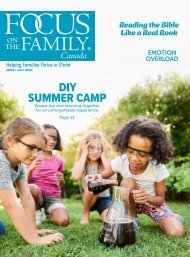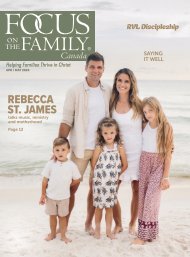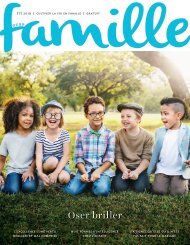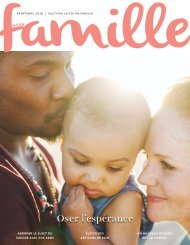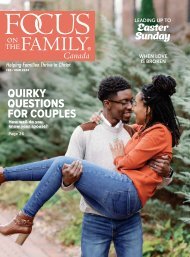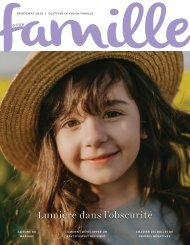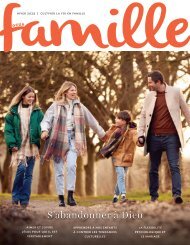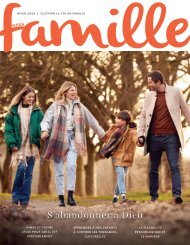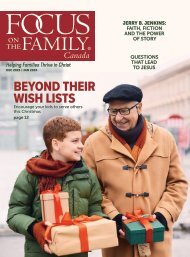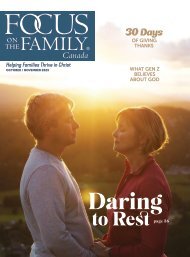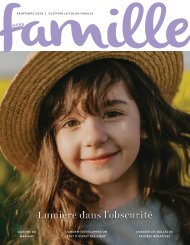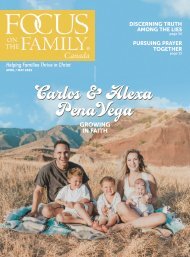Focus on the Family Magazine - August/September 2023
It can be a struggle to raise a family while balancing your work life, social life and relationships. Focus on the Family magazine is here to help! Each complimentary issue delivers fresh, practical Biblical guidance on family and life topics. Every issue comes packed with relevant advice to build up your kids, strengthen your marriage, navigate entertainment and culture, and handle common challenges you may face in your marriage and parenting journeys. Plus you'll find seasonal advice ranging from back-to-school activities to date night tips for you and your spouse.
It can be a struggle to raise a family while balancing your work life, social life and relationships. Focus on the Family magazine is here to help! Each complimentary issue delivers fresh, practical Biblical guidance on family and life topics.
Every issue comes packed with relevant advice to build up your kids, strengthen your marriage, navigate entertainment and culture, and handle common challenges you may face in your marriage and parenting journeys. Plus you'll find seasonal advice ranging from back-to-school activities to date night tips for you and your spouse.
- No tags were found...
You also want an ePaper? Increase the reach of your titles
YUMPU automatically turns print PDFs into web optimized ePapers that Google loves.
KIDS & TEENS / HOME SCHOOLING<br />
who God made <strong>the</strong>m to be<br />
Does your home-educati<strong>on</strong> philosophy<br />
treat your kids as projects or individuals?<br />
BY LEAH BODEN ILLUSTRATION BY ADAM LARKUM<br />
GROWING UP IN ENGLAND,<br />
I found joy and growth by singing in<br />
a choir, joining an after-school entrepreneurs<br />
club and eagerly serving in<br />
varying capacities in <strong>the</strong> local church.<br />
I loved to learn and was hungry to<br />
grow, but I seemed to be surviving<br />
ra<strong>the</strong>r than thriving in <strong>the</strong> traditi<strong>on</strong>al<br />
British school system in which I was<br />
enrolled.<br />
Even though I felt mismatched<br />
with <strong>the</strong> university system, I went<br />
anyway. When a professor told me,<br />
“You probably w<strong>on</strong>’t get <strong>the</strong> best<br />
degree classificati<strong>on</strong>, Leah, but you’ll<br />
do well in life. You’re just that kind of<br />
pers<strong>on</strong>,” I wanted to prove him wr<strong>on</strong>g.<br />
But he was right. I was never a standout<br />
in <strong>the</strong> classroom, yet I flourished<br />
in everyday activities.<br />
Later, as a mom new to <strong>the</strong> world<br />
of home schooling, I was introduced<br />
to <strong>the</strong> 19th-century British educator<br />
Charlotte Mas<strong>on</strong>, and I realized that<br />
academic and character growth—not<br />
performance—should define educati<strong>on</strong>.<br />
My discovery shed light <strong>on</strong> my own<br />
development and revoluti<strong>on</strong>ized my<br />
thinking toward teaching my four kids.<br />
In God’s image<br />
Charlotte Mas<strong>on</strong>’s method was based<br />
in recognizing that children are God’s<br />
work, not products of <strong>the</strong> educati<strong>on</strong>al<br />
system. They’re born whole and able<br />
to c<strong>on</strong>nect with <strong>the</strong> world. Our role as<br />
parents is to create an atmosphere and<br />
provide stimuli that will bring out <strong>the</strong><br />
best of who <strong>the</strong>y are. I d<strong>on</strong>’t believe<br />
that God places children in our homes<br />
for us to dictate who <strong>the</strong>y’ll become;<br />
He places <strong>the</strong>m into our lives so we<br />
can help <strong>the</strong>m develop into who He<br />
already made <strong>the</strong>m to be.<br />
This “born-pers<strong>on</strong>” approach to<br />
childhood turns <strong>the</strong> traditi<strong>on</strong>al educati<strong>on</strong><br />
path <strong>on</strong> its head. We d<strong>on</strong>’t need<br />
to race to catch up. We can slow down<br />
and delight in our children.<br />
Pers<strong>on</strong> before process<br />
When we view children as projects<br />
or “some<strong>on</strong>e we must educate,” we’re<br />
pr<strong>on</strong>e to use standardized curricula, to<br />
read texts <strong>on</strong>ly for comprehensi<strong>on</strong>, and<br />
to comply with set answers and laborious<br />
testing to ensure that our children<br />
“keep up.” When I first started educating<br />
my children from home, I stocked<br />
up <strong>on</strong> sec<strong>on</strong>dhand readers, math<br />
sheets and a Bible study <strong>on</strong> character.<br />
I used <strong>the</strong> latter diligently, but <strong>the</strong><br />
books and pages gradually got lost <strong>on</strong><br />
our home-school shelves.<br />
As a child, I loved <strong>the</strong> stories my mum<br />
read aloud in <strong>the</strong> evening, <strong>the</strong> variety of<br />
music my dad played around <strong>the</strong> house,<br />
<strong>the</strong> classic art <strong>on</strong> <strong>the</strong> wall and my journals<br />
full of poetry and innocent secrets.<br />
When we view children as people with<br />
interests, made in <strong>the</strong> image of God,<br />
we’re inclined to take a different view<br />
to <strong>the</strong>ir ga<strong>the</strong>ring of knowledge. We<br />
read good stories to our children. We<br />
play beautiful music for <strong>the</strong>m. We take<br />
<strong>the</strong>m into nature. We introduce <strong>the</strong>m<br />
to art. They take time transcribing or<br />
reciting <strong>the</strong>ir favorite lines from poetry,<br />
biographies and <strong>the</strong> Bible, and we<br />
invite <strong>the</strong>m into sincere c<strong>on</strong>versati<strong>on</strong>s.<br />
See before you say<br />
To believe that our children are “born<br />
pers<strong>on</strong>s,” we must become observers<br />
of <strong>the</strong>m. One of <strong>the</strong> greatest c<strong>on</strong>cerns<br />
I hear from home-schooling parents I<br />
coach is: “What if <strong>the</strong>y fall behind?”<br />
As Christians, we believe that our<br />
kids are born unique. Every hair <strong>on</strong><br />
<strong>the</strong>ir heads is numbered and known by<br />
God, and each design <strong>on</strong> <strong>the</strong>ir fingers<br />
and toes is distinctive <strong>on</strong>ly to <strong>the</strong>m. Yet<br />
when it comes to educati<strong>on</strong>, we sign<br />
up for <strong>the</strong> narrative that all children<br />
should and can learn <strong>the</strong> same thing at<br />
<strong>the</strong> same time. But it’s simply not true.<br />
18<br />
FOCUS ON THE FAMILY CANADA<br />
AUG / SEP <strong>2023</strong>



